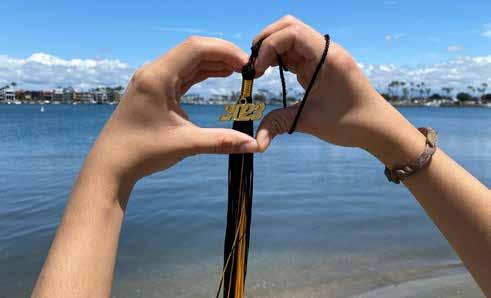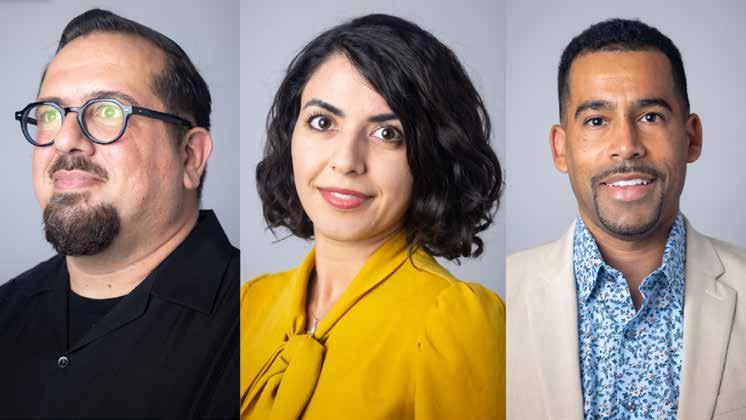
4 minute read
offer post-grad advice
BY SAMANTHA CORTES Staff Writer
To ease the fears of finishing college and embarking on a new journey, Long Beach State professors provided advice on navigating life post-graduation.

Matt Lesenyie, an assistant professor of political science, urges graduates to apply to as many jobs as possible even if the positions are not exactly what they are looking for. He believes that these temporary jobs are the stepping stones for a dream career.
“The first thing you get may not be your favorite thing,” said Lesenyie. “Get a job now so that you make enough money to get the job that you want to get.”
Lesenyie encourages graduates to continue applying for jobs even when faced with rejection, and to use the feedback to become a stronger applicant. He said he applied to 150 to 200 jobs before landing his current position at CSULB.
BY ANDREA LOPEZ Arts and Life Assistant
As cliché as it sounds, if you would have told me at 21 years old that I’d be graduating from a university with a degree in journalism, I’d laugh. I’d laugh because I’d be surprised and over the moon that I made it.
I was the girl who had very low self-esteem. The girl who had given up on school numerous times and even gave up on life. I turned to heavy partying to cope with the pain I had been enduring.
Graduating from college was a celebration I had dreamed about achieving for as long as I could remember, but never thought I’d live to see the day.
At 26 years old, I’m finally graduating at Long Beach State with a bachelor’s degree in journalism. I’m letting that sink in. I have grown up watching and reading the news, entertainment, breaking news, the weather, I watched it all.
I wanted to be a journalist, but knew I’d never be a journalist. Or so I thought.
Life has never been easy, but is it ever easy for anyone? The idea of giving up is far more appetizing than fighting through the tunnel of darkness to reach the light you’ve been searching for.
My family and I have struggled to be where we are now. In 2014, we left my
“Those rejections feel personal, they hurt and get your hopes up,” said Lesenyie. “The best way to take it is to view it all as practice.”
Yousef Baker, an associate professor of international studies, also urges students to not let rejection hold them back. Baker said that if one job or career path does not work, there are other ways for someone to succeed in their desired field.
“You have options and there are multiple ways of getting to the same place,” said Baker. “In the process, all kinds of new doors open up that you didn’t necessarily think even existed.”
Baker also said that graduates should not let salary or benefits entirely dictate the career they choose to pursue. He be- lieves individuals should instead reflect on how their careers will help those around them.
“Money is going to come and go, and your career is going to come and go,” said Baker. “It’s how you live in community with other people that will help you live better with yourself.”
Ava Hedayatipour, assistant professor of electrical engineering, believes that students should set short and long-term life goals to combat the nerves of graduation. She found that doing this made tackling her aspirations less daunting.
Hedayatipour encourages graduates to reach out to those in their same career fields to grow their networks and gain valuable insight.
In the words of Rafiki
“It’s very scary talking to someone with more seniority or who is on a different level than you,” said Hedayatipour.
“But then again, if you see an interesting person in your job in your life, set up a time to talk to them.”
Hedayatipour also advises students to keep in touch with their friends on a regular basis, especially when circumstances change or life gets too hectic.
“There are some parts of your life that can feel like the lowest that it can get and there’s also parts of your life that will feel like you are in ecstasy,” said Hedayatipour. “The lows will pass and the highs will pass. It’s all about the big picture.” tirelessly never given up on me, I’m here. I’m here not only because of them, but because I didn’t give up on myself. dad. We were unsure of what the future would hold for us, scared and numb.
At times it really felt like I was sinking to the bottom of the ocean, gasping for air. But I always somehow made it.
In 2020, I decided to officially go back to school for good. No more breaks. If I was going to get my degree, I was going to get my degree. And then COVID-19 hit. I had to decide. It was easy for me to quit it all again or keep going.
For the first time, I had my eye on the prize. I wanted my journalism degree and I wanted to walk across that stage and hear my name called.
I would not be where I am today without my older sister BreeAnn, her husband Mike and my fiancé Chris. They have constantly encouraged me, helped me, stayed up with me and loved me at my worst.
My mom and step-dad, Michelle and Albert, have also guided me and been my biggest cheerleaders. My two sisters, who have never given up through the worst trials, and I are all graduating this year. WE DID IT.
We were homeless for six months. We lived in a motel, then moved into a small room for us. All five of us worked to pay rent and pay for groceries, all while attending community college. The immense sadness and unknown direction kept me from wanting to continue my education.
As of 2023, we will all officially have our bachelor’s degrees, including my mom. Our lives looked so different from where we are now.
Because of the people who have
Hope and perseverance are so hard to attain, but so worth it. When life hurts, it’s your story you are writing. No one else gets to write your story.
As Rafiki from “The Lion King” once said, “oh yes, the past can hurt. But you can either run from it or learn from it.”
War, Diplomacy, and Society helped me understand the complexities of war and how war taps into every aspect of domestic life. This program also helped me build my research skills and helped me get closer to being a professor of history.
For me, Chapman’s War, Diplomacy, and Society program opened up the human toll of war in an entirely new way. A nation’s memory of war, passed down through generations, forms how societies conceive of themselves and the world. Only Chapman’s multidisciplinary program could have facilitated this kind of nuanced study of a history of warfare and its impact on people.











